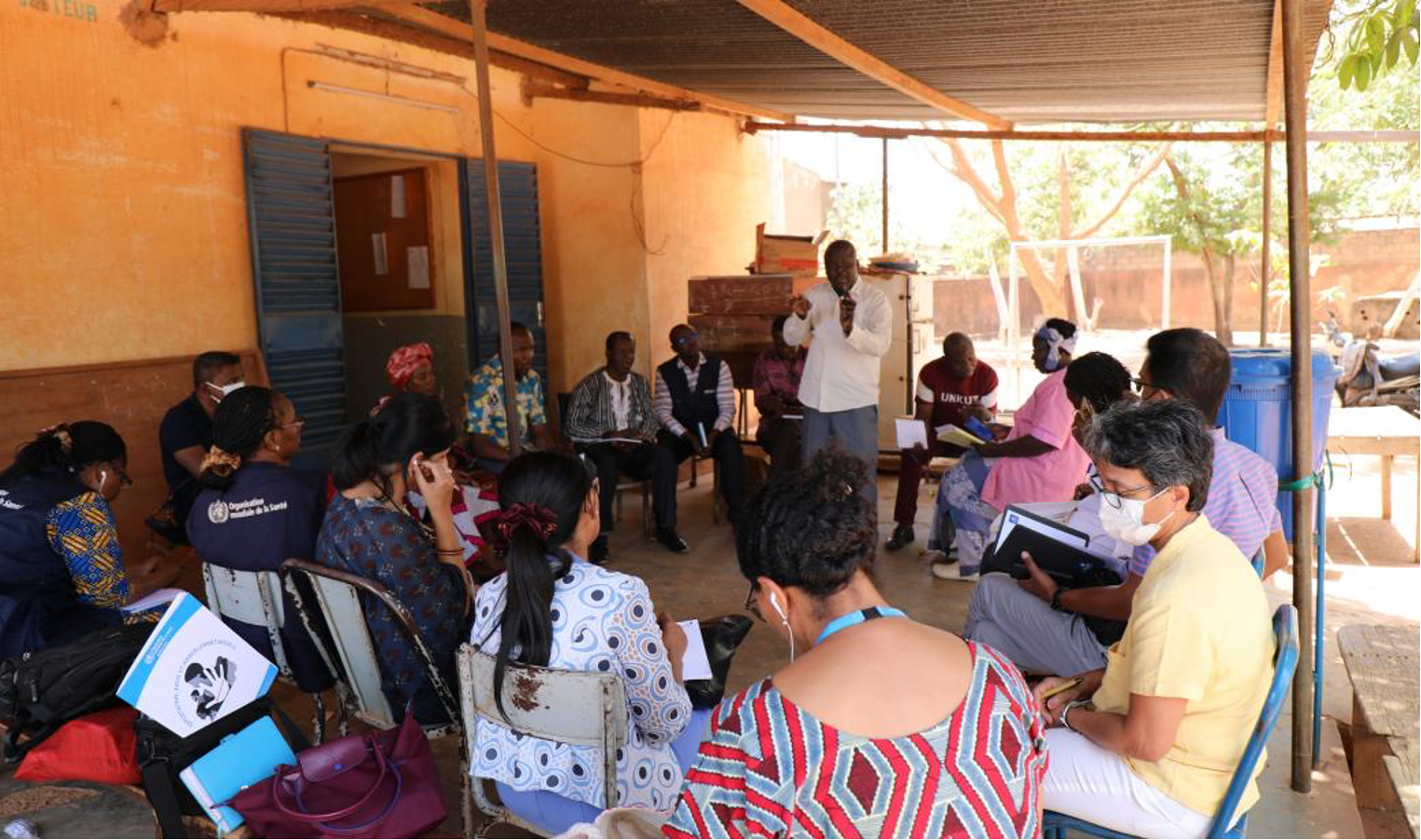/data-and-analytics-(dna)/data-exchange-(dex)/who-presence-in-countries--territories-and-areas.tmb-1920v.jpg?sfvrsn=f1146a2_2)
Empowering women in Burkina Faso through self-care:
expanding access to self-injected contraception for family planning
Stronger WHO country presence for a healthier and safer world
Joint Outcome 4.2.
Equity in access to sexual, reproductive, maternal, newborn, child, adolescent and older person health and nutrition services and immunization coverage improved
B urkina Faso faces significant reproductive health challenges, with a maternal mortality ratio of 222 deaths per 100 000 live births in 2018 and a contraceptive prevalence rate of 22%.1 The ongoing humanitarian crisis has displaced over 2 million people – 82% of whom are women and children – severely disrupting health care services, with 40% of health facilities affected.2
To address these challenges, Burkina Faso adopted the depot medroxyprogesterone acetate subcutaneous (DMPA-SC) self-injection, with the World Health Organization (WHO) providing technical and policy support. By 2024, these efforts had contributed to increasing the contraceptive prevalence rate to 32% and reducing maternal mortality to 198 per 100 000 live births, strengthening women's access to reproductive health care despite persistent challenges.1
WHO’s role in expanding DMPA-SC self-injection
WHO has recognized DMPA-SC self-injection as a key intervention to improve contraceptive access, particularly in resource-limited settings. In Burkina Faso, where security concerns and geographic barriers limit access to family planning, WHO collaborated with the Ministry of Health and partners to integrate self-injection into the national reproductive health programmes.
By aligning with global best practices, WHO supported the development of evidence-based guidelines and policy frameworks, facilitating the adoption of self-injection as a sustainable contraceptive option. This initiative has empowered women to manage their reproductive health independently. The expansion of DMPA-SC coverage has been phased, starting in 2018 with one district in each of three regions.
By 2024, the initiative had reached all 13 regions and 70 health districts, ensuring nationwide accessibility for long-term impact.

Debriefing session following a field visit to a health centre with family planning directorates from Madagascar and Burkina Faso.
Capacity-building and service delivery
Training and capacity-building were central to the successful rollout of the DMPA-SC self-injection. WHO supported the Ministry of Health in training 12 000 health care providers across the public and private sectors. Additionally, targeted training was provided to 428 providers in 28 public health facilities and 160 providers in 40 private facilities, enhancing their ability to counsel and support women opting for self-injection.
WHO supported the Ministry of Health in training 12 000 health care providers across the public and private sectors.
By equipping health care providers with the necessary skills, WHO strengthened service delivery, enhanced client counselling and boosted providers’ confidence in supporting women who opt for self-injection. WHO’s adaptable approach, which included community outreach initiatives and alternative distribution channels, ensured continued contraceptive access in hard-to-reach areas, particularly in conflict-affected and remote regions where traditional health services are often disrupted. As a result, more women are now able to independently manage their contraception, overcoming barriers to reproductive health access. The programme’s impact is evident in high retention rates, with over 80% of users continuing self-injection in 2024, highlighting its acceptability and user satisfaction.
Health systems strengthening and sustainability
To enhance supply chain efficiency and to prevent stock-outs, WHO supported the establishment of a monitoring system for DMPA-SC distribution, improving inventory oversight and ensuring a consistent supply. Additionally, WHO has advocated for maintaining Burkina Faso’s free health care policy for pregnant women and children under 5 to sustain these family planning gains.
Institutionalizing self-injection training within medical curricula is another key sustainability measure. WHO has worked with professional associations and academic institutions to integrate self-injection modules into medical training programmes, ensuring that future health care providers are well equipped to support this method. Strengthening multisectoral dialogue on reproductive, maternal, neonatal, child and adolescent health is also essential for long-term impact.
Further efforts are needed to expand community-based self-injection services and explore integrated health care approaches, combining DMPA-SC with HIV self-testing, malaria diagnosis and complementary traditional medicine services. These strategies will ensure a holistic approach to women’s health while reinforcing reproductive autonomy.
WHO has advocated for maintaining Burkina Faso’s free health care policy for pregnant women and children under 5 to sustain these family planning gains.
WHO remains committed to adapting its support to Burkina Faso's evolving health priorities, particularly in the areas of reproductive health and maternal care. Building on the successes of DMPA-SC self-injection, WHO will continue working closely with the Ministry of Health and local partners to integrate family planning into broader health systems, ensuring long-term accessibility and sustainability. The results from this initiative not only contribute to increasing contraceptive prevalence and reducing maternal mortality, but align with the country's broader public health objectives of strengthening health systems, promoting women’s empowerment and improving overall health outcomes in the face of ongoing challenges. WHO’s ongoing partnership with Burkina Faso will focus on expanding these gains, integrating self-injection into other health services, and fostering resilience within the health care system to meet the needs of all women and girls.
